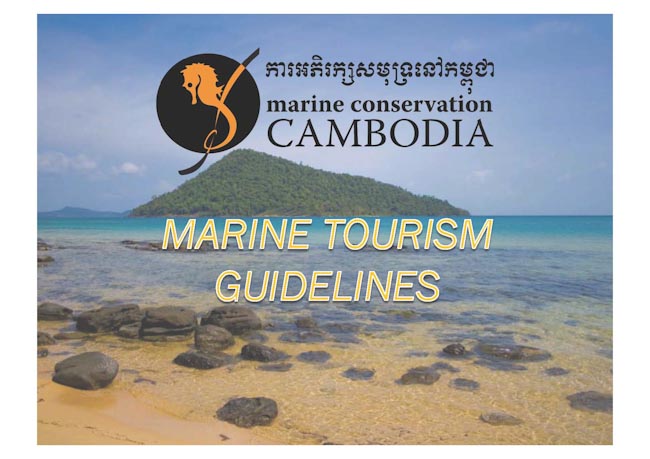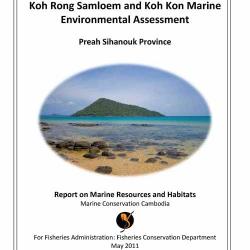Frequently Asked Questions for Incoming Volunteers and Interns
This is a quick fire guide relating to the basics of your stay with us, for anything internship or academic related please contact us with your enquiry and one of our researchers will get back to you as soon as possible.
Q: Where is Marine Conservation Cambodia located?
Marine Conservation Cambodia’s main location is on the island of Koh Seh in Kep Province
Q: How do I get to Marine Conservation Cambodia?
A: For volunteers arriving in Phnom Penh, frequent and inexpensive ($5-10) buses run from Phnom Penh to Kep. Capitol or Sorya bus companies are popular and recommended. A Marine Conservation Cambodia boat connecting to the island leaves from Kep to Koh Seh at approximately 3:00pm on Mondays, Wednesdays, Fridays and Sundays. Please contact MCC at least one week prior to your arrival to confirm your date of arrival in Kep and our staff will help you arrange your travel on the free boat out to the island. Taxi’s and airport pick ups can be arranged if requested.
Q: What type of visa should I get for volunteering in Cambodia?
A: General tourist visas ($25 USD) that are good for 30 days are available at all border crossings into Cambodia and at the international airports. These visas can be renewed only once for an additional 30 days and you can renew them easily on mainland in Sihanoukville. If you hope to travel within Cambodia and volunteer with MCC for more than 60 days, it is advised you obtain a business/“ordinary” visa ($35 USD) that can be renewed for three, six, nine or 12 months. More information on Cambodian visas can be found : http://www.mfaic.gov.kh/evisa/
Q: What length of time can I volunteer at MCC?
A: Most Marine Conservation Cambodia volunteers stay with the project for at least one or two months, but many volunteers and interns stay for mid- or long-term placements that can last up to six months or longer. It is beneficial for both the individual and the organization to allow enough time for the volunteer to obtain his or her scuba certification (open water and advanced) and be trained on Reef Check survey methodology so that they can become a contributing member of the conservation efforts. Diving certification and survey methodology training can take between two to three weeks to complete. Volunteers who choose to stay for only a few weeks will find that they are just hitting their stride as a volunteer right as it’s time for them to depart the island. We believe that volunteers who can take the time to stay for at least a month or longer will have a more rewarding and multi-faceted experience at MCC.
Q: What type of clothing should I bring for my work at Marine Conservation Cambodia?
A: Clothing should be suitable for warm/hot, humid weather, so light, quick-drying fabrics are essential in the tropical climate. Due to the frequent dive and snorkeling schedule, we suggest that you bring at least two swimsuits/swim trunks to alternate between. Out of respect to the Khmer culture, female volunteers are required to remain covered while in the village, on the beaches and on the dive boat, so please be prepared with shirts and shorts that you can swim in daily. We recommend rash guard shirts (often used for surfing and diving) and board shorts or lightweight running shorts. Many volunteers also find it useful to wear socks under their fins to reduce rubbing and blisters from frequent diving. Your work at MCC will also include beach clean-ups and physical work that may require you to get dirty, so please bring clothing suited for working in hot weather. Many volunteers also bring sports sandals or amphibious shoes that can handle wet conditions and protect their feet while doing beach clean-ups and walking through water and over rocks and sand. It’s also good to be prepared with a rain jacket or poncho for occasional rain storms. Many of these items can be purchased on mainland in Sihanoukville or Phnom Penh if you are in need of extra supplies before you arrive or during your time at MCC.
Q: Is there any specialized gear I should bring with me to the island?
A: MCC provides jugs of purified drinking water, so we advise bringing a refillable water bottle to help you stay hydrated while you work. (It also helps reduce the waste of purchasing bottled water in the village.) Volunteers may also find quick-drying camp/travel towels useful, along with waterproof bags or pouches to keep their valuables dry and sand-free on the beach and boats. When diving and surveying, it is helpful to have a waterproof (good for up to 25 meters) digital watch that can be used to time your dives. Additionally, volunteers are recommended to bring their own mask, snorkel and fins to use for diving and snorkeling (MCC provides shared equipment, so this gear is not compulsory). A waterproof camera or waterproof housing for your camera (good for at least 15 meters deep) is also a useful and fun tool for diving. Lastly, waterproof/sweatproof sunscreen is essential for working in the strong sun and mosquito repellant for keeping the bugs at bay. It is not necessary to bring your own sleeping bag, sleeping pad or mosquito net. (Note: Please see the information further below about what gear MCC provides for our volunteers during your placement.)
Q: Do I need to bring a personal first aid kit with me to the island?
A: We do have a fully stocked first aid kit but we also recommend that you bring your own. Due to the nature of the work and the tropical environment, it is important to bring a first aid kit with you. Volunteers often find themselves dealing with bug bites and small cuts or scratches that have become infected due to the frequent diving and living in a damp, tropical environment. We suggest that your first aid kit contain the following:
- insect repellant
- cortisone cream for insect bites
- wound cleaner (such as hydrogen peroxide, iodine and/or alcohol wipes)
- antibacterial ointment
- a good supply of bandages/plasters in a variety of sizes
- gauze
- sport tape
- butterfly stitches (ie. 3M Steri Strips)
- tensor bandage
- We also suggest you bring the standard supplies and medications for travel to Southeast Asia:
anti-malarial pills
- antibiotics (gastro intestinal and respiratory) Please Note: Bacteria in Southeast Asia has developed resistance to ciprofloxacin, so please make sure to check your government’s travel safety web site before you make your purchases. If you are not allergic to the Penicillin family, it is recommended that you use amoxicillin or biaxin.
- allergy medication for insect bites
- cold medicationdecongestant
- anti-diarrheal medication
- anti-nausea medication
- pain and fever medication
- fungal/yeast medication
If you find in need of additional first aid supplies, most supplies and medications can be purchased at pharmacies on mainland in Sihanoukville. The medications are all inexpensive and “over-the-counter” and they do not require prescriptions from a doctor. MCC also has a first aid kit on hand for emergencies, but we encourage our volunteers to arrive on the island prepared to take care of themselves.
Q: It is necessary to take malaria pills in Cambodia?
A: Cambodia is within a malarial zone; however there has not been a case of malaria on Koh Rong Samloem in over five years. There have been cases of malaria reported in the central and northern parts of Cambodia, so it would be wise to take preventative measures if you plan to travel into those areas either before or after your time volunteering at MCC. It is up to each individual to protect themselves in the way they see fit. Anti-malarial medication can be purchased without a prescription from pharmacies on mainland in Sihanoukville.
Q: Do I need travel or health insurance in order to volunteer at MCC?
A: Though it is not compulsory to obtain insurance in order to volunteer with our organization, we highly recommend that you have coverage from a company in your home country. In the off chance of a medical emergency or damage or theft of your belongings, MCC will not be responsible to cover the costs associated. We like smart volunteers and smart volunteers get insurance coverage.
Q: Is it safe to bring valuables with me to the island?
A: There is very little crime on the island, but we recommend that all valuables (phones, cameras, mp3 players, tablets, laptops, etc.) are kept stored out of sight when they’re not in use. The volunteer bungalows can be locked but volunteers seldom choose to do so for the sake of convenience. Some volunteers bring small luggage locks to keep their valuables stored in their backpack after they’ve unpacked and settled into their bungalow. The tropical environment is often damp and sandy and insects are quite prevalent throughout the volunteer accommodation, so please use your best judgment with your electronics. MCC cannot take responsibility for any damaged, lost or stolen items, so we recommend you refrain from bringing anything that you couldn’t stand to lose.
Q: As an MCC volunteer, what is provided to me during my time volunteering for the organization?
A: MCC provides our volunteers with three hot meals a day, drinking water, tea and coffee in the main bungalow. All volunteers are provided with shared oceanfront accommodation (four people per bungalow) which includes a bed, pillow, linen, a light blanket and a mosquito net. It is not necessary to bring a sleeping bag. Volunteers who participate in scuba diving are provided with a mask, snorkel, fins, wet suit and a full scuba kit.
Q: What type of food is provided for volunteers?
A: Our local Khmer staff cooks three hot meals daily for our volunteers. The food is entirely Cambodian cuisine which contains lots of rice, vegetables, eggs and meat. We also give the opportunity for volunteers to get involved in the kitchen and show us their culinary skills.
Q: What is the volunteer accommodation like?
A: Our volunteers live in traditional-styled bungalows that are divided by gender. Each beach bungalow sleeps four volunteers and includes two twin-sized bunk beds and a bathroom. The bathroom has a western-styled toilet and a bucket shower.
Q: Do I need to be scuba certified to volunteer with MCC?
A: About 50 percent of the work done at MCC is done whilst scuba diving so it is best if volunteers can dive and fully participate in the project. If you are not already open water certified our staff can provide you with the appropriate training for different levels of PADI certification. We recommend that all of our volunteers become advanced certified so they have the navigation and buoyancy skills necessary to work on our reef and seahorse survey teams. The cost of certification is not included in your weekly volunteer fee. Courses and relevant certifications are available as follows:
Open Water Diver
Advanced Diver
Open Water & Advanced Package
Rescue Diver – Including Emergency First Responder certification -OR- $300 USD if you already hold a current EFR certification
Dive Master: Option available for volunteers staying for a minimum of three months. Price can be discussed with an MCC staff member prior to your arrival or during your stay.
Q: What type of volunteer work can I participate in at MCC?
A: Our work days are split into two parts: water- and land-based activities. Volunteers who are advanced diver certified will be trained in survey methodology and participate in seahorse or reef surveys twice daily. The seahorse surveys contribute to our research that is establishing population demographics, distributions, possible migration patterns and mating habits. The reef surveys help us keep record of various indicator species densities and sizes to help monitor our success at protecting the reefs that surround Kep Archipelago. The data we collect is analyzed and compiled quarterly into reports that are sent to the Cambodian government to help plan future conservation strategies. Volunteers with educational and/or professional backgrounds that would allow them to contribute to data collection and analysis or report writing are strongly encouraged to apply for an internship at MCC.
Q: I have an idea for a special project I would like to execute during my time with MCC. Is this allowed?
A: The MCC team encourages volunteers to identify areas where they can utilize their background and experience to contribute to the conservation and community projects. If you have a particular skill set or idea, many projects are feasible utilizing recycled or inexpensive materials. If you have idea before your arrival, feel free to email them to MCC staff for preapproval. Most volunteers arrive at MCC and quickly identify special ways they can assist.
Q: What is the work schedule like for MCC volunteers?
A: Volunteers work Monday through Friday from 9:00 a.m. to approximately 5:00 p.m. every day. You can expect to start your day with breakfast at 8:00 a.m. before beginning your work. Each day is split with diving during half of the day and land-based activities during the other half of the day and the schedule alternates depending on the tides and diving conditions. Advanced certified divers participating in the surveys generally have the opportunity to dive twice daily. Lunch is served at 12:00 p.m. and work resumes at 1:00 p.m. Expect to stay busy and participate in a full day of work until 5:00 p.m. and have a short break before dinner is served at 7:00 p.m. Following dinner, the MCC staff hosts trivia games, conservation documentary films and occasional information sessions.
Q: What is there to do in my free time on the island?
A: Volunteers have nights and weekends off, so there is ample free time to fill. Many volunteers arrive with games and playing cards to fill the time between activities and after meals. MCC also has an extensive lending library/book exchange filled with a wide variety of literature and science books. Our volunteers are welcome to go for “fun dives” (non-survey dives) on the weekend as well as snorkeling on the reef. Swimming, sunbathing and lounging in the multitude of hammocks that hang in the bungalows are also great ways to pass time. Groups of volunteers can arrange jungle treks and fishing trips with local guides who charge a small fee ($2-5 USD per individual). Games of football or frisbee happen quite frequently on the beach and there are always a lot of village children around who are eager to play games. The locals are very friendly and often excited to practice their English, so we encourage volunteers to spend time in the village getting to know the locals.
Q: What are the ways I can help MCC with conservation and sustainable practices?
A: It is suggested that volunteers bring their own reusable water bottle and/or cup and a reusable shopping bag to help reduce the waste associated with their purchases in Sihanoukville and M’Pai Bei village. The MCC bungalows are surrounded by the jungle and the sea, so bringing biodegradable/phosphate-free soaps and if at all possible, biodegradable sunscreen (it’s better for the reef!) will lessen your impact on our natural surroundings. Our volunteers often find themselves in the village, interacting with and making purchases from the locals. We expect our volunteers to lead by example by reducing their waste by utilizing their reusable water bottles and cups for drink purchases in the village. It’s also crucial to use the rubbish bins in the village and the recycling and compost bins in the main bungalow.
It is also suggested that volunteers refrain from using insect repellant, deodorant and other products that come in aerosol cans since they cannot be disposed of safely within Cambodia. We also recommend that your electronics use rechargeable batteries (vs. disposable ones) and suggest the purchase of a wind-up, solar powered, or rechargeable torch/flashlight.
Q: Is MCC in need of any materials I could bring with me to donate to the project?
A: Our small English classroom is always in need of basic school supplies such as pencils, pens, markers, crayons, colored pencils, dry erase markers, paper (lined, plain and colored), scissors, glue sticks, pencil sharpeners and more. We also appreciate reading books, workbooks, coloring books, flashcards and games that will assist children with learning English. Additionally, any sporting goods that the kids can use on the beach will be put to good use. Children’s clothing in all sizes can be used widely by the families in the village, as will basic first air supplies. If you have dive gear or technology such as laptops, cameras, etc. that could be useful for our data collection or research, please contact info@marineconservationcambodia.org to discuss the items you would like to donate.
Q: Is there an ATM where I can withdraw money on the island of Koh Rong Samloem?
A: The closest ATM is located right on the pier where our boat leaves from, there is a second located at Kep beach if the first is out off order.
Please Note: The United States Dollar and the Cambodian Riel are widely used and distributed throughout Cambodia. Most prices for transportation, accommodation and food are listed in USD.
Q: How much spending money should I bring with me to the island?
A: Since meals and accommodation are covered by the volunteer participation fee, volunteers usually spend very little money while living on the island. Soft drinks, beer and snacks are at normal shop prices and available at the kitchen.
Q: Does MCC recommend a specific Cambodian mobile phone service provider where I could obtain a SIM card for my unlocked mobile phone?
A: Our staff and volunteers have had success with SIM cards from Hello, Smart, Met Phone and Mobi Phone. The mobile reception on the island is quite weak, so regular access can be difficult even with one of the recommended providers.
Q: Is there wi-fi access and/or a mobile data connection on the island?
A: There is limited internet connection available on the island, smart phones can pick up a weak mobile data signal in most places on the island. The reception is sufficient enough for making phone calls, text messaging and sending/receiving emails, but the data connection is not strong enough for good web browsing.
Q: Are there laundry facilities on the island?
A: Volunteers can choose to hand wash their laundry with provided laundry detergent or to pay $1 USD per kilogram for hand-wash, air-dry laundry service by our local staff. There are machine laundry services available on mainland.
Q: Is there an address where I can receive mail during my stay with MCC?
A: The Cambodian mail system is known for being slow and unreliable at times. We have had instances where parcels have arrived many months after their intended recipient had departed MCC. If you still want to chance it, you can have mail sent to “Post Resante” at the Sihanoukville post office. In theory, the packages that arrive there will be held at the post office for pick-up. Packages should be addressed as follows:
YOUR NAME
Post Resante
Code 18000
(Insert your local Cambodian phone number and email address)
Sihanoukville
Cambodia
18000
If you have additional questions about volunteering with Marine Conservation Cambodia, please feel free to email our staff at info@marineconservationcambodia.org.
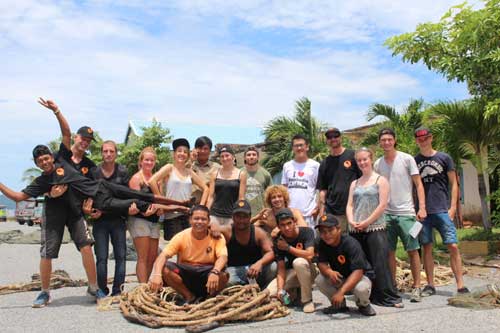 Who we are is a fairly simple question to answer. Marine Conservation Cambodia’s volunteer and internship program came to be simply out of necessity. The rate in which the Cambodian waters and local fishing communities were being destroyed was unprecedented. It was not inconceivable that the fishing industry and livelihood of the fisherman would have vanished in 10 years. If this had happened it would have been more than a loss of income for these families. It would also have been the loss of a significant and fundamental part of their culture, potentially forever.
Who we are is a fairly simple question to answer. Marine Conservation Cambodia’s volunteer and internship program came to be simply out of necessity. The rate in which the Cambodian waters and local fishing communities were being destroyed was unprecedented. It was not inconceivable that the fishing industry and livelihood of the fisherman would have vanished in 10 years. If this had happened it would have been more than a loss of income for these families. It would also have been the loss of a significant and fundamental part of their culture, potentially forever.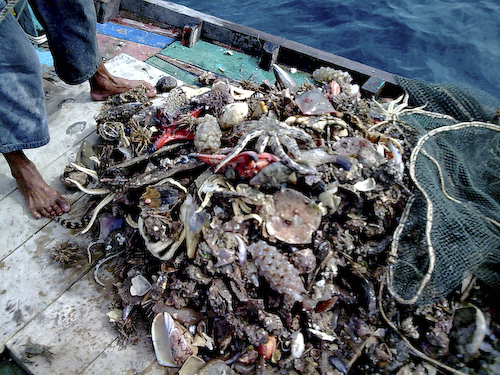 The practices used for fishing were getting ever more destructive as fish stocks plummeted and the demand for sea products increased. From dynamite fishing, cyanide fishing, electric fishing, to the massive trawling nets that destroy everything without discretion. All aspects of the sea were being decimated, the dynamite and cyanide destroying and poisoning the reefs, the electric fishing killing every fish, invertebrate, or living organism they pass over regardless of the sex, size, or species, and the massive trawling nets that uproot the sea grass, break the reefs and basically kill everything they come in contact with. It simply needed to be stopped.
The practices used for fishing were getting ever more destructive as fish stocks plummeted and the demand for sea products increased. From dynamite fishing, cyanide fishing, electric fishing, to the massive trawling nets that destroy everything without discretion. All aspects of the sea were being decimated, the dynamite and cyanide destroying and poisoning the reefs, the electric fishing killing every fish, invertebrate, or living organism they pass over regardless of the sex, size, or species, and the massive trawling nets that uproot the sea grass, break the reefs and basically kill everything they come in contact with. It simply needed to be stopped. 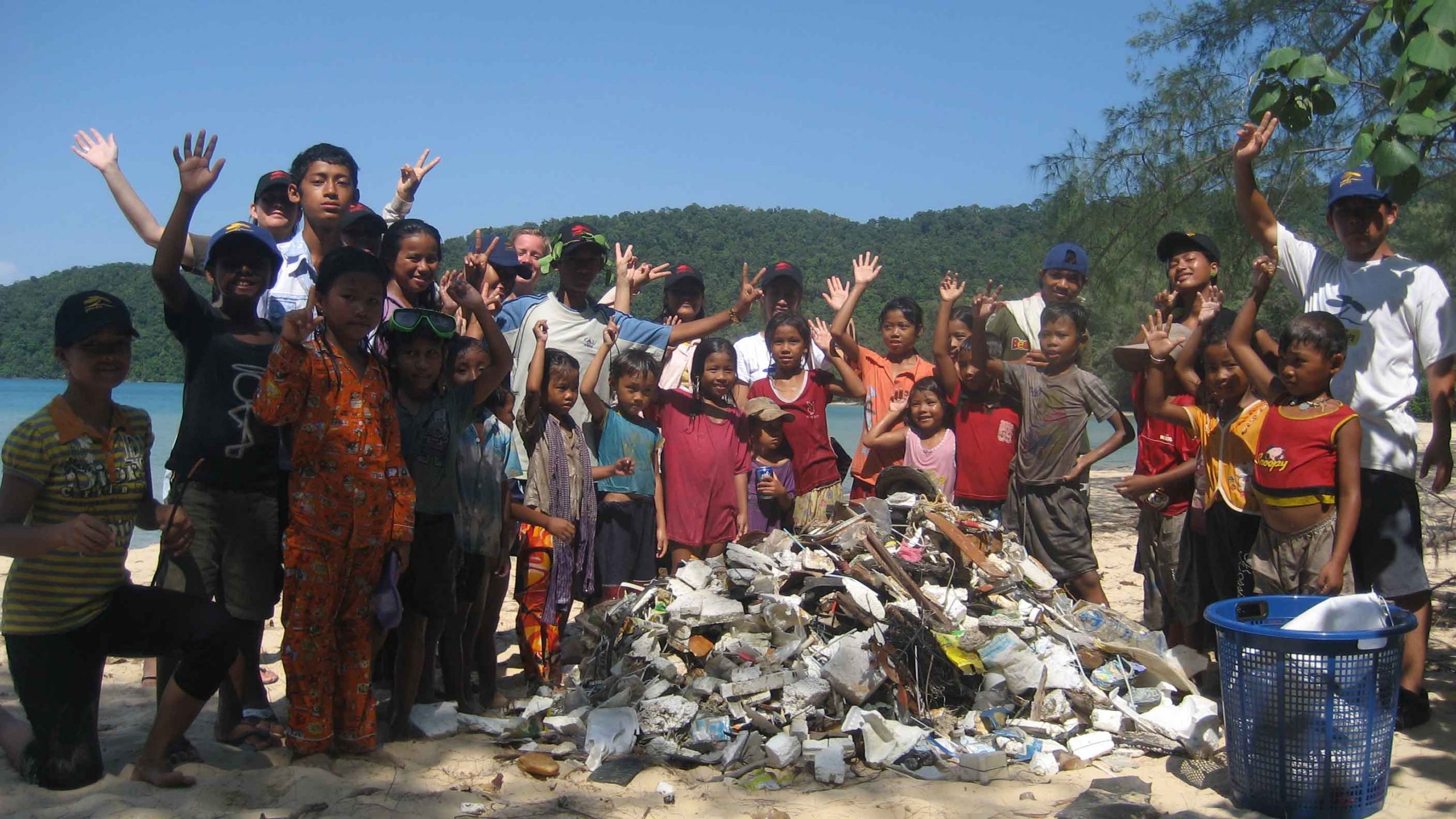 Marine Conservation Cambodia saw the country needed help and decided to step in. At first it was a difficult process, as foreigners coming in trying to change things was not looked highly upon. Making sure that volunteers and interns understood about Cambodian culture and had an understanding of how to interact in a developing country was not an easy task. Also the fishing industry is big money in many Asian countries, so some important people would be facing a serious loss of income. Rumors spread that MCC was here to stop fishing all together and groups were formed to chase MCC out of the country. After years of hard work, playing the political game, and simply letting our actions speak for themselves, quite quickly the local communities realized we were here to help. As time went on the Cambodian government also realized our goal was not to end fishing, but to achieve a sustainable and also a responsible way of fishing whilst supporting local communities and help to increase Cambodia’s marine resources.
Marine Conservation Cambodia saw the country needed help and decided to step in. At first it was a difficult process, as foreigners coming in trying to change things was not looked highly upon. Making sure that volunteers and interns understood about Cambodian culture and had an understanding of how to interact in a developing country was not an easy task. Also the fishing industry is big money in many Asian countries, so some important people would be facing a serious loss of income. Rumors spread that MCC was here to stop fishing all together and groups were formed to chase MCC out of the country. After years of hard work, playing the political game, and simply letting our actions speak for themselves, quite quickly the local communities realized we were here to help. As time went on the Cambodian government also realized our goal was not to end fishing, but to achieve a sustainable and also a responsible way of fishing whilst supporting local communities and help to increase Cambodia’s marine resources.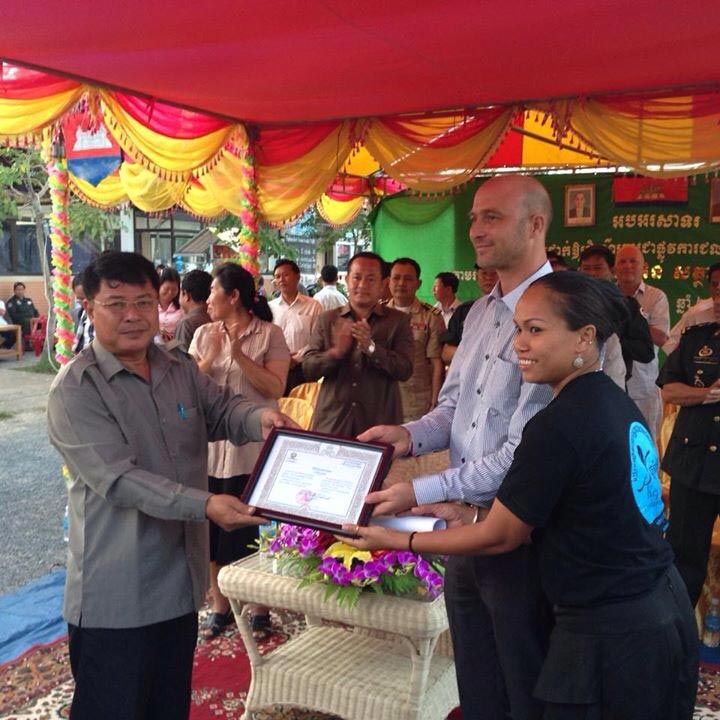 After the successes in creating and protecting Cambodia’s First Large Marine fisheries management area around the Koh Rong Archipelago, We were invited by the Royal Government of Cambodia to begin our work again in Kep province. After the initial marine research reports were produced by our Marine Scientists, volunteers and interns, they were accepted by the National Fisheries Administration and Kep’s provincial government leading to the approval of Keps first MFMA (Marine Fisheries Management Area) being created. This new MFMA around the Kep Archipelago is already seeing the return of many species that had disappeared from the area. We are seeing reefs begin to grow again in a healthy way. Sea grass is re-growing offering important shelter to crabs and other marine organisms, and seahorses are also starting to make a slow comeback. Seeing this is the greatest reward MCC, and everyone of our volunteers and interns can receive. Millions of dollars would not even come close to the satisfaction MCC feels knowing what we are doing is truly making a difference for the beautiful country of Cambodia.
After the successes in creating and protecting Cambodia’s First Large Marine fisheries management area around the Koh Rong Archipelago, We were invited by the Royal Government of Cambodia to begin our work again in Kep province. After the initial marine research reports were produced by our Marine Scientists, volunteers and interns, they were accepted by the National Fisheries Administration and Kep’s provincial government leading to the approval of Keps first MFMA (Marine Fisheries Management Area) being created. This new MFMA around the Kep Archipelago is already seeing the return of many species that had disappeared from the area. We are seeing reefs begin to grow again in a healthy way. Sea grass is re-growing offering important shelter to crabs and other marine organisms, and seahorses are also starting to make a slow comeback. Seeing this is the greatest reward MCC, and everyone of our volunteers and interns can receive. Millions of dollars would not even come close to the satisfaction MCC feels knowing what we are doing is truly making a difference for the beautiful country of Cambodia.
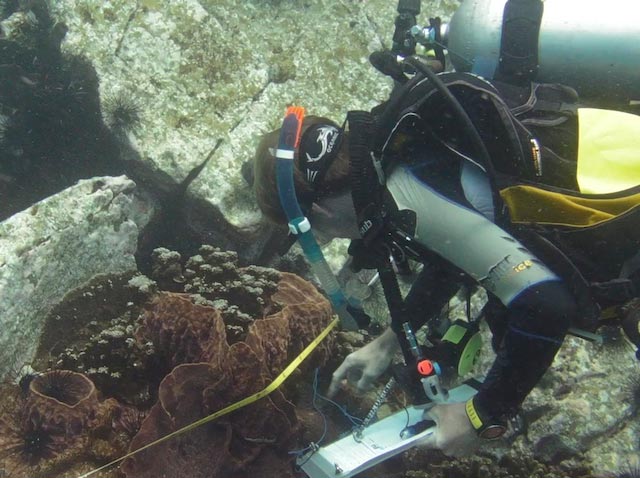
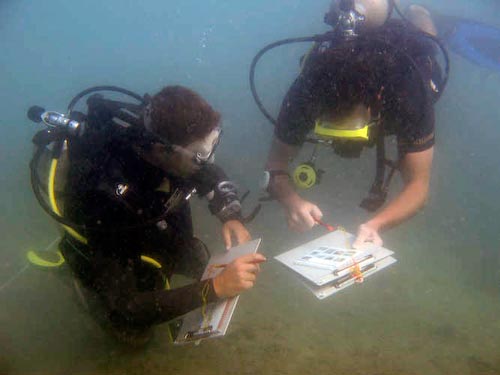 The need for immediate Pro-active conservation must be coupled with the collection of solid data to prove beyond doubt which actions have are having a detrimental effect on the local ecosystems and also to prove the benefits of any conservation programs. When witnessing first hand the large amount of damage that can be done in a very short time it is easy to understand the need for protection but for anyone not directly witnessing the destruction a need for clear data is essential. When we take action towards marine conservation we need to assess whether an area needs protection, why it needs protection and what it needs protection from. These are just a few of the major questions we need to ask. We need to look at all factors from the obvious to the not so obvious.
The need for immediate Pro-active conservation must be coupled with the collection of solid data to prove beyond doubt which actions have are having a detrimental effect on the local ecosystems and also to prove the benefits of any conservation programs. When witnessing first hand the large amount of damage that can be done in a very short time it is easy to understand the need for protection but for anyone not directly witnessing the destruction a need for clear data is essential. When we take action towards marine conservation we need to assess whether an area needs protection, why it needs protection and what it needs protection from. These are just a few of the major questions we need to ask. We need to look at all factors from the obvious to the not so obvious. 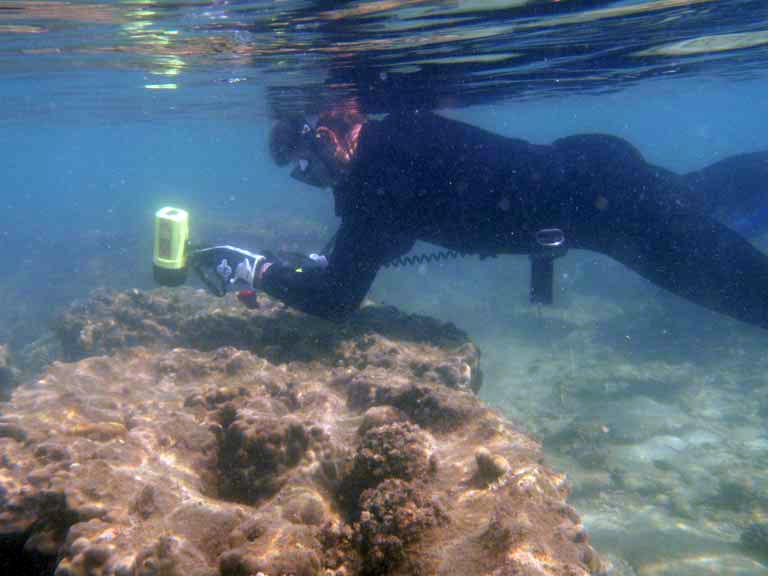 Through a scientific monitoring program our team of scientific researchers and trained research divers investigate the marine environmental conditions within specific areas, this information has and is being used to assist the local and national government in their strategy planning for marine conservation and integrated coastal management. As part of our team you will be involved in marine conservation and marine research, this means that during your time with us you will be trained in a number of marine survey methodologies and identification techniques that will allow you to monitor our target sites. Besides learning the methodology of collecting data, you will also learn how to enter and analyse that data. The identification training will allow you to learn about which species live in Cambodian coastal ecosystems and how to recognize them.
Through a scientific monitoring program our team of scientific researchers and trained research divers investigate the marine environmental conditions within specific areas, this information has and is being used to assist the local and national government in their strategy planning for marine conservation and integrated coastal management. As part of our team you will be involved in marine conservation and marine research, this means that during your time with us you will be trained in a number of marine survey methodologies and identification techniques that will allow you to monitor our target sites. Besides learning the methodology of collecting data, you will also learn how to enter and analyse that data. The identification training will allow you to learn about which species live in Cambodian coastal ecosystems and how to recognize them.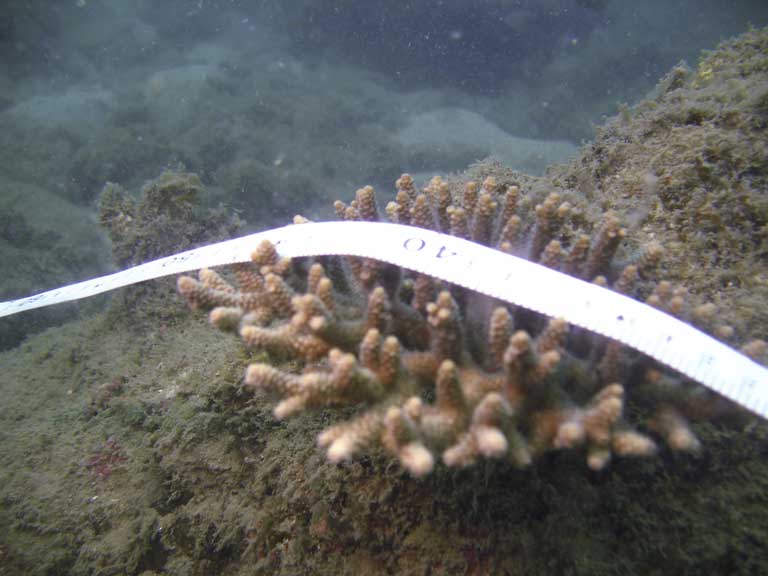 Once trained you will join together with other volunteers, interns and specialists and spend time in the field, conducting marine surveys using the scientific techniques you have learnt in order to collect, collate and analyse data on the marine environment. Investigative projects include seahorses surveys, Benthic Surveys, biodiversity and abundance surveys to name a few.
Once trained you will join together with other volunteers, interns and specialists and spend time in the field, conducting marine surveys using the scientific techniques you have learnt in order to collect, collate and analyse data on the marine environment. Investigative projects include seahorses surveys, Benthic Surveys, biodiversity and abundance surveys to name a few.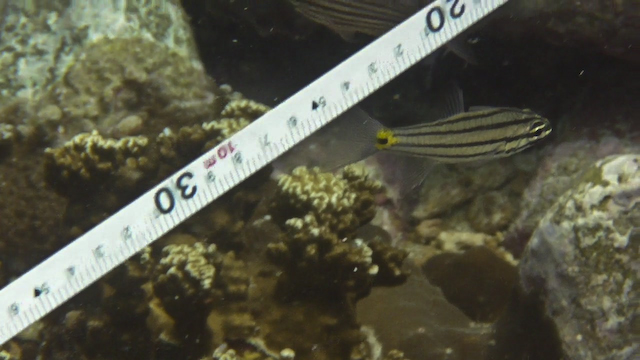 Our Team is among the few to be out there all the time, doing research and keeping the destruction at bay. We are conducting extensive surveys throughout the coast of Cambodia. In our first 2 years of operation we recorded data from over 1000 different sites and now after 8 years of operation we have extensive experience covering Cambodian marine habitats, ecosystems and marine life, from community socio-demographics to quarterly and yearly reports on marine reef heath, seahorse diversity, abundance and seagrass monitoring we pretty much do it all.
Our Team is among the few to be out there all the time, doing research and keeping the destruction at bay. We are conducting extensive surveys throughout the coast of Cambodia. In our first 2 years of operation we recorded data from over 1000 different sites and now after 8 years of operation we have extensive experience covering Cambodian marine habitats, ecosystems and marine life, from community socio-demographics to quarterly and yearly reports on marine reef heath, seahorse diversity, abundance and seagrass monitoring we pretty much do it all.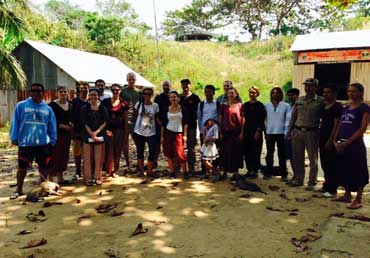
 At MCC we are always looking for those dedicated volunteers and interns who truly want to make a difference. If you are looking for a beachside vacation with the odd dive here or there, MCC probably isn’t the place for you. We do NOT offer voluntourism, we do not try to sell you something we think you want, we integrate you into our team and continue the work we have been entrusted to carry out involving you and utilising your skills and passion, our goal is conservation and the regeneration of a once beautiful area that is in the beginnings of recovery.
At MCC we are always looking for those dedicated volunteers and interns who truly want to make a difference. If you are looking for a beachside vacation with the odd dive here or there, MCC probably isn’t the place for you. We do NOT offer voluntourism, we do not try to sell you something we think you want, we integrate you into our team and continue the work we have been entrusted to carry out involving you and utilising your skills and passion, our goal is conservation and the regeneration of a once beautiful area that is in the beginnings of recovery.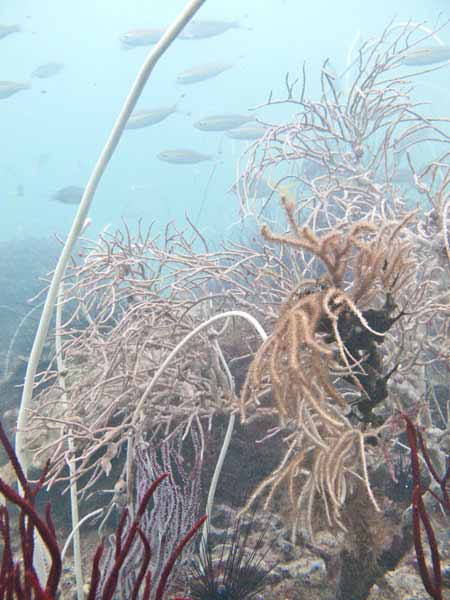
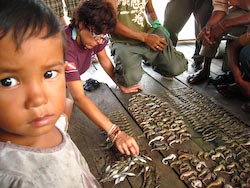
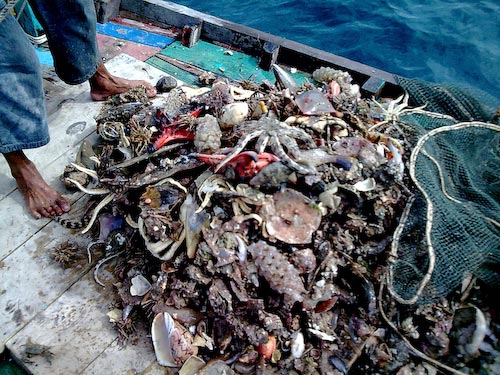 vessels entering Cambodian waters practicing the same destructive fishing practices as Cambodian fishing vessels. With the damage caused by foreign vessels added to what is being done by local fishing communities it is not unrealistic to imagine Cambodian waters being pushed to the point of permanent collapse.
vessels entering Cambodian waters practicing the same destructive fishing practices as Cambodian fishing vessels. With the damage caused by foreign vessels added to what is being done by local fishing communities it is not unrealistic to imagine Cambodian waters being pushed to the point of permanent collapse.
